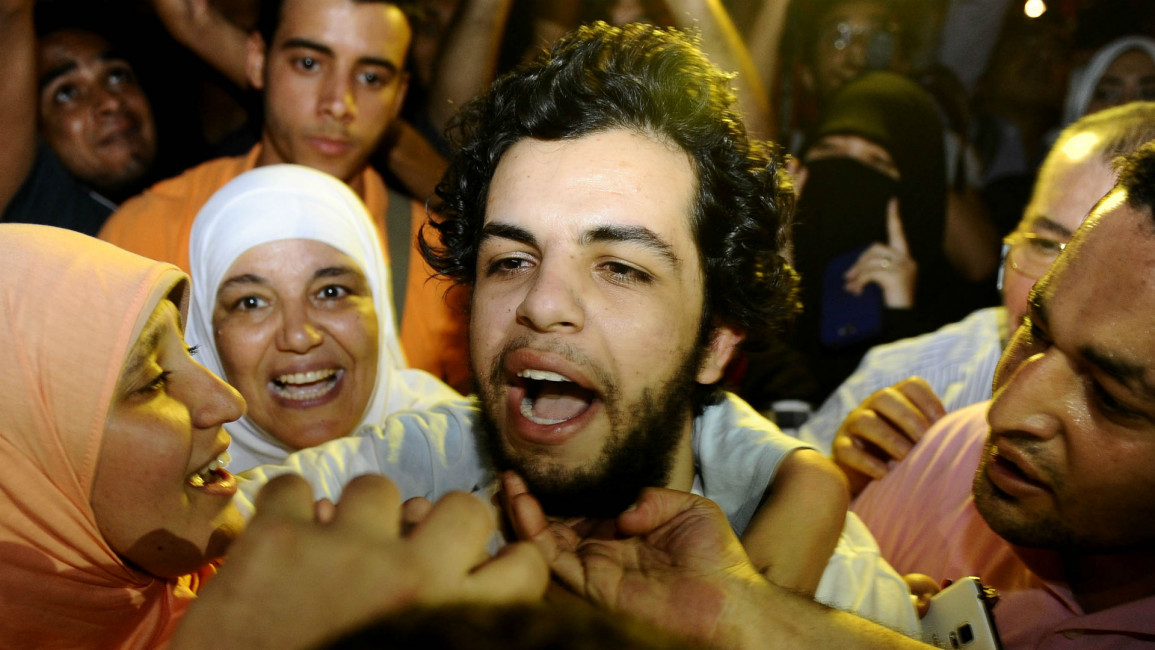
The ongoing silencing of dissent in Egypt
It's 2015, and the struggle has neither disappeared nor been resolved. Revolution and change is never an overnight process; changing a system that has been marred by decades of violence, repression, corruption, and foreign involvement cannot occur in a couple of years.
It takes decades if not centuries for real change to occur. What we have seen has been the people's demand for representative government with a constitutions and elections.
With a revolution in the political order came defensive responses from existing states. In the case of Egypt, one response deeply rooted in Egyptian history was the imprisonment of political opponents and the silencing of dissent.
Recently the world is witnessing mass trials in Egypt's judicial system where at times more than 500 prisoners have been tried at once.
Political prisoners
| The current wave of political prisoners in Egypt came largely as a consequence of the Rabaa massacre in 2013. |
The increase in political prisoners came after the military coup removed Mohamed Morsi in 2013. Imprisonment of political opponents and dissent is not foreign to Egypt.
The state has a history of imprisoning opponents dating back to the days of Nasser. Authoritarianism has created an entrenched tradition of imprisoning and silencing dissent and opposition.
The Muslim Brotherhood is not new to this imprisonment; the organisation has a long and complicated history with the state, from imprisonment, torture, to a complete ban.
The current wave of political prisoners in Egypt came largely as a consequence of the Rabaa massacre in 2013, a violent dispersal of pro-Morsi supporters by the Egyptian military.
The military had encircled the Rabaa al-Adawaiyya square, blocked all exit routes, and stormed it with live ammunition. The incident led to hundreds of deaths and thousands of arrests. Morsi supporters, journalists and even bystanders were rounded up and jailed.
The result has been a complete mockery of the judicial system. Media coverage escalated after members of al-Jazeera's staff were arrested and imprisoned.
Hunger strikes became widespread as those jailed proclaimed their innocence and demanded their rights. What occurred were intermittent trials where imprisonment would be reinstated for another 45 days or more.
The state began a number of mass trials against those it was holding.
Abdallah Elshamy, an al-Jazeera Arabic journalist, was arrested while covering the protests. He was jailed and went on a hunger strike for 149 days before being released.
In March, he gave a speech at the University of London's SOAS college as part of a campaign to free all al-Jazeera staff (#FreeAJStaff) and others unlawfully held by the regime.
Ordinary people and activists have been jailed by the state, with little if any access to lawyers and due legal process. The detention is usually extended almost arbitrarily every 45 days. In regards to legal representation, the lawyers themselves are tied up having to work within a corrupt justice system and a lack of accountability.
The case of Irish teenager Ibrahim Halwa has caught international attention. At only 17, he was arrested (along with his three sisters) while hiding in the mosque during the Rabaa massacre. Along with 493 others, he is charged with "causing deaths and criminal damage". His sisters were all released on bail.
Reports have indicated he was subject to beatings and denied medical treatment for a bullet wound in his hand, which is now permanently disfigured. At one point Halwa was kept in solitary confinement in a cell less than a metre square with no light. He faces being part of a mass trial and the death penalty if convicted.
The case of Mohamed Soltan has also gained international attention. Soltan is a dual Egyptian-US citizen arrested during the pro-democracy demonstration in Rabaa in 2013.
He has been on a hunger strike for more than a year, having been in prison for almost two years now. At the time of his arrest, he was shot in the arm, reportedly tortured, and denied adequate medical care.
| The authorities have denied the defendants access to lawyers, and are not allowed to speak at or attend court hearings. |
Without pain relief, a cellmate performed ad hoc surgery on Soltan's arm using pliers. On April 11, 2015, he was sentenced to life in prison. Soltan has publicly appealed to the US government stating, "If I'm still alive then I ask my government, the government of the United States of America, is my life not worth anything to you?"
Many expected that Soltan's US citizenship would mean the most powerful state in the world would be fighting for him. However, no such thing has happened. Instead, the US government has responded by lifting the freeze on military aid and ensuring the release of $1.3bn in annual military aid to Egypt. Along with the aid, Sisi will receive 12 F-16 fighter jets and 20 Harpoon missiles.
Death sentence
Early March witnessed the first death sentence to be carried out as a result of these mass trials, with the hanging of Mahmoud Ramadan for his role in the murder of a young critic of Morsi during the Rabaa incident.
At least 720 other people have also been sentenced to death. While the regime has responded with heavy punishments for pro-Morsi supporters, there has not been a single conviction for policemen or soldiers for their involvement in the deaths of more than 1,000 protestors.
Egypt's mass trials and the authorities denial of legal representation to the defendants renders any sort of right to defence meaningless.
The state's response to civilian demands for political change is just history repeating itself. The authorities have denied the defendants access to lawyers, and are not allowed to speak at or attend court hearings.
Thousands are still being held in horrible conditions and denied their human rights as the regime continues to make a complete charade of due process.
We see the endless cycle of repression at the hands of the state as it continues to be supported by foreign aid.




